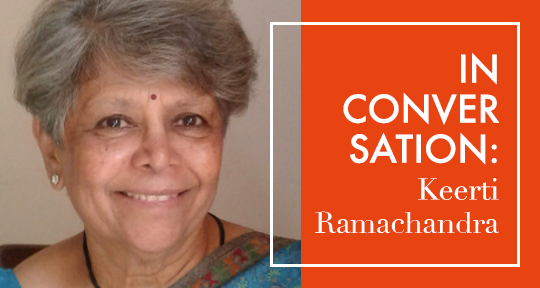Keerti Ramachandra is a Katha AK Ramanujan Award-winning translator who works out of Marathi, Kannada, and Hindi. She has translated Vishwas Patil’s Sahitya Akademi Award-winning novel Jhadajhadati (A Dirge for the Dammed), which was shortlisted for the Crossword Prize.
This interview was conducted in two parts. I first met Ms. Ramachandra in her house on Residency Road, Bangalore, where she talked about her journey into translation. We continued the conversation over email where she discussed the various books she’s worked with, the process of collaboration, how her work as an educator and editor seeps into translation, and the state of Indian publishing.
Suhasini Patni (SP): You’ve been translating for several years now. Can you talk about how you came into translation?
Keerti Ramachandra (KR): I come from a bilingual family and a multilingual society. Every day, I would come home from school and report to my mother the events of the day in Marathi. Then repeat it all for my grandparents in Kannada, and then argue vociferously about the veracity of my stories with my brothers in English. Every now and then, our nanny used to ask me in Dakhani (her variety of Hindi): “Kya hua, bibi? Humkobhi bolo tho!” (What happened, baby? Tell us also!). And I would. Isn’t that true of so many Indians? We inhabit several languages simultaneously and travel between them easily and unselfconsciously.
Formal translation happened much later. Until 1994, I was a complete Anglophile. With a background in English literature and the extensive use of English in everyday life, I claimed English was my mother tongue.
Though we spoke all the languages at home, I had never studied Marathi, my mother’s tongue. I could read and write Kannada, my father’s tongue, since it was compulsory until matriculation, but knew only the classic “textbook” inclusions. I had better acquaintance with Hindi because it was a compulsory subject in school and college. Therefore, it seems outrageous, foolhardy, or audacious for me to get into translating Marathi literature!

